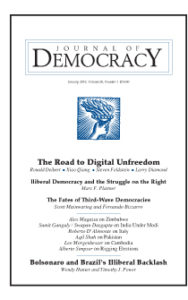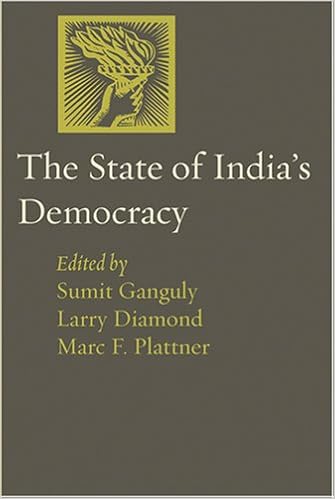 India’s liberal democracy is now under assault, as evidenced by a pattern of assaults on minorities, press freedom, and the independence of key cultural and intellectual institutions, argues analyst Sumit Ganguly,. co-author of The State of India’s Democracy. The current right-of-center government, dominated by the Bharatiya Janata Party (BJP), appears intent on transforming India’s pluralistic, open, and secular state into an ethnic and illiberal democracy, he writes in India Under Modi: Threats to Pluralism, an article for the NED’s Journal of Democracy:
India’s liberal democracy is now under assault, as evidenced by a pattern of assaults on minorities, press freedom, and the independence of key cultural and intellectual institutions, argues analyst Sumit Ganguly,. co-author of The State of India’s Democracy. The current right-of-center government, dominated by the Bharatiya Janata Party (BJP), appears intent on transforming India’s pluralistic, open, and secular state into an ethnic and illiberal democracy, he writes in India Under Modi: Threats to Pluralism, an article for the NED’s Journal of Democracy:
To that end it has sought to place ideologues in key governmental institutions, attempted to curtail academic freedoms at a leading university, and made efforts to curb an otherwise feisty mass media. A weak political opposition, which had in any case failed to demonstrate much mettle when in government prior to the BJP’s 2014 electoral victory, now appears utterly incapable of stemming this illiberal tide. As a consequence, India’s future as a liberal democracy appears to be at some risk.
But charges that Prime Minister Narendra Modi and his party threaten liberal-democratic safeguards are best understood as the overheated reaction of an insular elite that is still struggling to come to terms with its democratic displacement from power, according to parliamentarian Swapan Dasgupta.
 Ever since Prime Minister Narendra Modi’s Bharatiya Janata Party led the National Democratic Alliance to power in 2014, the government’s critics—disproportionately concentrated in academia and the media—have been insisting that it is set to refashion the “idea of India,” he writes for the JOD in India Under Modi: The Establishment Overreacts.
Ever since Prime Minister Narendra Modi’s Bharatiya Janata Party led the National Democratic Alliance to power in 2014, the government’s critics—disproportionately concentrated in academia and the media—have been insisting that it is set to refashion the “idea of India,” he writes for the JOD in India Under Modi: The Establishment Overreacts.
Yet as the Modi government enters the final months of its five-year term, it is important to spell out what the regime has not done: It has not remotely compromised democracy, judicial independence, or religious pluralism. The sheer scale of the antipathy shown toward Modi cannot be explained by his governance record. This antipathy springs, rather, from the determination of the erstwhile Establishment to reclaim its old clout and influence from the counter-Establishment that has taken shape under Modi.
The Hudson Institute and the Embassy of India host a conference on “Delivering Democracy in India,” featuring:
- Rick Rossow, chair in U.S.-India policy studies at the Center for Strategic and International Studies;
- Santosh Jha, deputy chief of mission in the Embassy of India;
- Vinay Sahasrabuddhe, member of the Indian parliament;
- Richard Fontaine, acting CEO, Center for New American Security;
- Surjit Bhalla, Oxus Research and Investments;
- Sanjay Paswan, member of the Indian parliament;
- Daniel Twining, president of the International Republican Institute;
- Ramaswami Balasubramaniam, author of “I, the Citizen: Unraveling the Power of Citizen Engagement”
9 a.m. – February 13, 2019. Venue: Hudson Institute, 1201 Pennsylvania Avenue NW, Suite 400, Washington, D.C. RSVP








